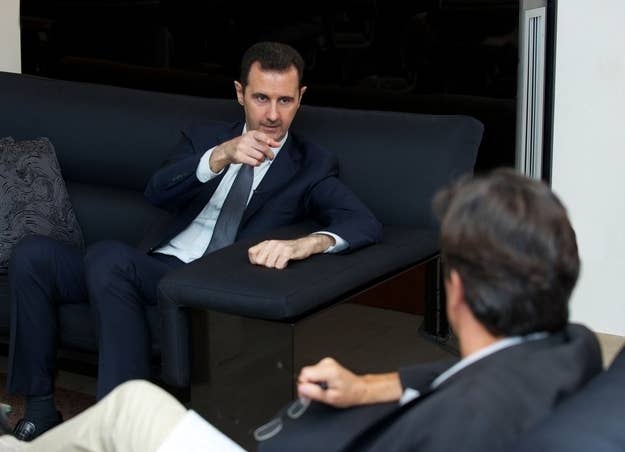
Syrian President Bashar al-Assad has said there is no longer hope for a political solution to the conflict in Syria and that the only way to deal with the rebels challenging his leadership "is to annihilate them."
In an interview with Le Figaro, a French newspaper, Assad claimed that rebel forces had been almost entirely infiltrated by al-Qaeda.
"We are fighting terrorists," he said. "80-90% of those we are fighting belong to al-Qaeda. They are not interested in reform or in politics. The only way to deal with them is to annihilate them."
Assad said Obama's decision to take to Congress a vote on military strikes against Syria in response to a suspected chemical weapons attack on Aug. 21 was a sign of weakness: "Obama is weak because he is facing pressure from within the United States." Speaking to the congressmen who will vote after Congress comes back to session next week, he said that previous U.S. military action, including Iraq and Libya, had brought nothing to the United States. "How would it be in the interest of the United States for instability and extremism to increase in the Middle East?
He also said he had warned his regional neighbors, from Jordan to Turkey, from getting involved: "If we fail to beat terrorism in our country, it will naturally spread to other countries." He implied that Jordan had been receptive to his warnings. "As for [Turkish Prime Minister Recep] Erdogan, I don't think he has the least idea of what he is doing."
Assad issued a stark warning that intervention in Syria could prompt a region-wide conflict. "The Middle East is a powder keg, and today the flame is coming very near," he said. "We cannot talk merely about the Syrian response, but about what might take place after the first strike. But nobody knows what will happen. Everyone will lose control of the situation when the powder keg explodes. Chaos and extremism will spread. There is a risk of regional war."
Asked if Syria would consider targetting Israel in response, he said: "You surely do not expect me to tell you what our response would be."
Assad denied that he had carried out a chemical weapons attack on a Damascus suburb last month. U.S. intelligence shows that more than 1,400 people were killed. Secretary of State John Kerry said on Sunday that the U.S. had evidence Assad had deployed sarin gas.
"We have challenged the United States and France to put forward a single proof," Assad said. "Obama and [French President Francois] Hollande have been unable to do so, even to their own people." He also said the accusation was illogical: "What would be the benefit to us in using chemical weapons when our situation on the ground is better today than it was last year? Why would an army, in any state, use WMD at the very moment when it is making progress using conventional weapons?"
He then muddled a response on whether Syria possessed chemical weapons: "I'm not at all suggesting that the Syrian army does or does not possess such weapons. Let's suppose that our army wishes to use WMD: Is it really going to do so in an area where it is actually present and where soldiers have been wounded by these weapons, as the U.N. inspectors found during their visit to the hospital where they were being treated? Where is the logic in that? Moreover, is it possible to use weapons of mass destruction in a Damascus suburb without killing tens of thousands of people, given that these elements are carried by the wind?"
He said "all the accusations are based on allegations made by terrorists and on arbitrary video clips broadcast on the Internet."
Asked if France, whose president has said he will support the U.S. in an attack on Syria, was now an enemy of Syria, Assad said: "Whoever contributes to the financial and military support of terrorists is an enemy of the Syrian people. Whoever works against the interests of Syria and its citizens is an enemy."
"There will be repercussions, negative of course, for French interests," Assad said.
